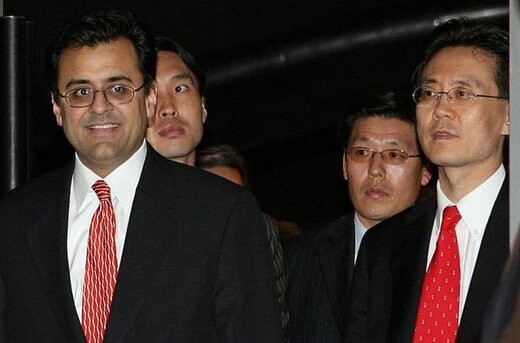hankyoreh
Links to other country sites 다른 나라 사이트 링크
Korean gov't accepts unprecedented U.S. demands in trade deal

Under a free trade deal agreed upon with the U.S. on April 2, the South Korean government agreed to include two measures regarding automobile trade in return for immediate U.S. tariff eliminations on certain import Korea passenger cars. However, the two measures were found to be unprecedented, having not appeared in any free trade deal.
On April 8, an official at the Ministry of Foreign Affairs and Trade, requesting anonymity, said, "In no FTA was there a 'fast-track procedure' and a 'snap back,' " referring to the two measures by name.
Unlike ordinary dispute settlement procedures, the fast-track procedure halves the period of dispute settlement by scrapping bilateral consultations. The 'snap back' clause allows the U.S. to reinstate its tariff on Korean-made auto imports - which it agreed to scrap in the trade deal - as a countermeasure should the Korean government not implement certain regulations on automobiles imported from the U.S. through the fast-track procedure. These regulations include taxation as well as environmental and safety technology standards.
"While there was lots of controversy within our negotiation team about including the measures, Trade Minister Kim Hyun-chong and chief negotiator Kim Jong-hoon also participated in the discussion. We had no choice but to accept the U.S. demands because U.S. negotiators kept arguing they need these measures to persuade Democrat-controlled Congress to approve the deal," the official said.
Another ministry official said, "In the World Trade Organization agreement, there is a fast-track procedure for fruit, which is easily spoiled, but the procedure is hardly used. Durable goods such as cars are not the subject of fast-track procedures," the official said.
Previously, the Korean government had deemed problematic the two accepted measures. According to a March 15 government document on core issues of the Korea-U.S. FTA, obtained by The Hankyoreh, the fast-track procedure is "problematic because terms on automobiles contain major domestic policy issues such as taxation and technology standards." Regarding the snap back clause, the Korean government hinted it would not accept its inclusion in an FTA, saying, "The dispute settlement procedure is aimed at resolving a problem, not aimed at regulating trade terms, such as anti-dumping or countervailing tariffs."
However, the government finally ended up accepting the fast-track procedure during high-level FTA meetings on March 21, and in last-minute ministerial negotiations, the government agreed to accept the snap back clause in exchange for gaining immediate U.S. tariff eliminations on some Korean passenger cars imported there.
Hanshin University professor Lee Hae-young said, "The government placed shackles on automobile policy in order to secure as low as a 2.5-percent tariff cut on cars imported to the U.S."
"To resolve unbalanced auto trade between South Korea and the U.S., it was unavoidable for us to accept the U.S.'s non-tariff demands," said an official at the Korean delegation. "We didn't specifically review the fact that the fast-track procedure and snap back clause don't exist in any other FTAs."
Please direct questions or comments to [englishhani@hani.co.kr]
Editorial・opinion
![[Column] Is Korean democracy really regressing? [Column] Is Korean democracy really regressing?](https://flexible.img.hani.co.kr/flexible/normal/500/300/imgdb/original/2024/0705/2917201664129137.jpg) [Column] Is Korean democracy really regressing?
[Column] Is Korean democracy really regressing?![[Column] How tragedy pervades weak links in Korean labor [Column] How tragedy pervades weak links in Korean labor](https://flexible.img.hani.co.kr/flexible/normal/500/300/imgdb/original/2024/0703/8717199957128458.jpg) [Column] How tragedy pervades weak links in Korean labor
[Column] How tragedy pervades weak links in Korean labor- [Column] How opposing war became a far-right policy
- [Editorial] Korea needs to adjust diplomatic course in preparation for a Trump comeback
- [Editorial] Silence won’t save Yoon
- [Column] The miscalculations that started the Korean War mustn’t be repeated
- [Correspondent’s column] China-Europe relations tested once more by EV war
- [Correspondent’s column] Who really created the new ‘axis of evil’?
- [Editorial] Exploiting foreign domestic workers won’t solve Korea’s birth rate problem
- [Column] Kim and Putin’s new world order
Most viewed articles
- 110 days of torture: Korean mental patient’s restraints only removed after death
- 2Months after outcry over “torture devices,” Justice Ministry proposes more restraints for immigratio
- 3Beleaguered economy could stymie Japan’s efforts to buoy the yen
- 4[Column] Is Korean democracy really regressing?
- 5Koreans are getting taller, but half of Korean men are now considered obese
- 6[Column] How tragedy pervades weak links in Korean labor
- 7Former bodyguard’s dark tale of marriage to Samsung royalty
- 8Real-life heroes of “A Taxi Driver” pass away without having reunited
- 9[Editorial] Exploiting foreign domestic workers won’t solve Korea’s birth rate problem
- 10Democrats ride wave of 1M signature petition for Yoon to be impeached